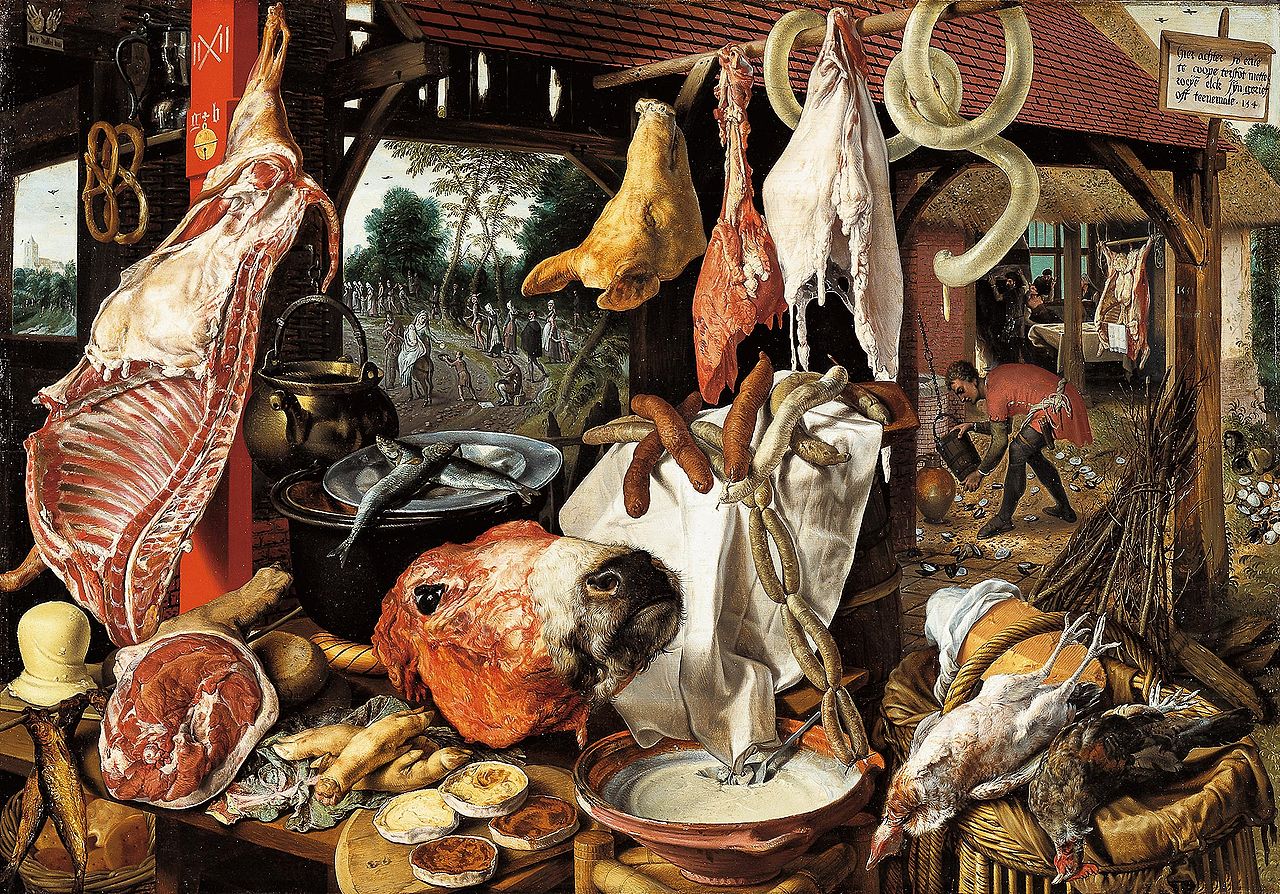
Meat! A protein-rich food, but not the only one. By painter Pieter Aertsen.
Based on my experience of being vegan for many years, it
seems that the major concern of fretful family members, curious acquaintances, and
friends considering veganism is that veganism does not supply enough protein. Please
allow me break down some myths about veganism and protein.
First, a brief disclaimer. This isn’t me trying to convert
anyone to veganism. I believe that the
best way to convince anyone to be vegan is to be a good example and to share my
recipes and food. Most people just close their ears if they feel preached to or
judged. And I certainly don’t think veganism is for everyone; it depends on
your body and your circumstances. My intent in this post is to share what I’ve
learned about protein, because it’s surprisingly different from popular
knowledge about protein.
1. You need a lot of protein to be healthy.
Certainly you do need protein to be healthy. You may be
surprised, however, by how much protein is enough. For adults and teenagers,
about 50 grams of protein is what most health organisations recommend. How much
is 50 grams of protein? Well, a cup of yoghurt or a glass of milk has about 10
grams of protein, and a small serving of meat has about 20 grams of protein. So
if you have yoghurt or milk with breakfast, plus meat with lunch and dinner, and
then you add in the protein that you’re getting from all the other things in
your diet, you’re almost certainly getting way too much protein.
Amount of protein recommended by the CDC
2. Meat is the only food that is high in protein.
Wait a second, protein from the other things in your diet?
Not from dairy products or meat? Many people are surprised to learn that most
things we eat have at least a bit of protein. For instance, a banana has about
2 grams of protein. And a lot of things we don’t even think of as good protein
sources also have a lot of protein. For instance, 100 grams of dry pasta has 13
grams of protein. Then of course there are the staples of the vegetarian diet
that omnivores perplexingly refer to as “meat alternatives”. Soy is a great
source of protein, with tofu, for example, having about the same protein
density as meat (20 grams per serving). For those who don’t like soy, there are
nuts, beans, peas, quinoa, or seeds.

Tofu is a great source of vegan protein, but it's far from the only one!
To give an example, here’s a day of food which may seem to
our meat-centric culture to be deficient in protein, but is actually perfectly
fine. The grams of protein are given in brackets.
Breakfast: Orange juice (1.7), banana (2), cheerios (3) with
half a cup of milk (4)
Lunch: Peanut butter (8) and jam sandwich (two slices of
bread = 16), apple (0.5)
Dinner: Pasta (13) with tomato sauce (3), salad (1)
Total protein: 52.2 grams
3. The more protein the better.
It’s clear from the examples above that to get the
recommended amount of protein you don’t need to eat meat or dairy. But if some
protein is good for you, maybe a lot is even better? This seems to be the logic
of the Atkins diet. If you eat too much protein it’s true that you’ll just pee
it out. So maybe you should eat too much protein just to be sure you’re getting
enough, and then pee the extra out. Unfortunately, there may be health risks involved in consuming excess protein. There is evidence that your body will increase
its excretion of calcium with that protein, which could be damaging to your bones.
Excess protein also increases your likelihood of forming kidney stones by 250%.
Like all good things, protein is best in moderation.
4. Your proteins need to be “complete”.
This is a myth that I’d like to address in more detail in a
future post, but let me just say here that the concept of “complete proteins”
is a little out-dated. To quote the CDC, “In the past, it was thought that
these complementary proteins needed to be eaten at the same meal for your body
to use them together. Now studies show that your body can combine complementary
proteins that are eaten within the same day.”
5. If you lead a lifestyle that requires high protein, such
as being an athlete, you can’t be vegan.
Although your average person needs about 50 grams of protein
per day, some people, such as athletes, need more protein at certain points in
their lives. For instance, when I was preparing for and recovering from surgery
I increased my (vegan) protein intake to help my body heal faster. It’s
actually pretty trendy for athletes to be vegan, and there are plenty of
examples of successful athletes who are vegan. Check out this athlete’s blog. One
easy way to boost your protein as a vegan is to drink vegan protein shakes.
Another is to snack regularly on nuts. Perhaps the most obvious way is to make
sure there are protein-rich elements in every meal (ex, tofu, beans, quinoa).
 Basketball player Montell Owens is vegan
Basketball player Montell Owens is vegan 

No comments:
Post a Comment